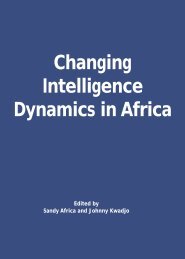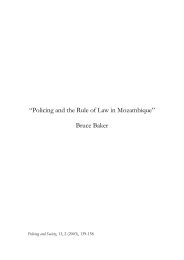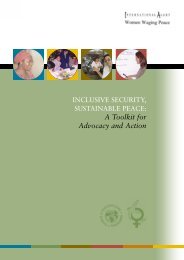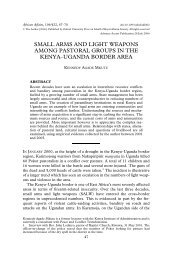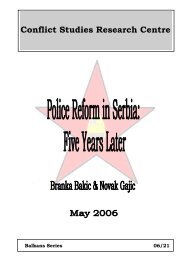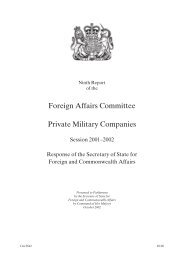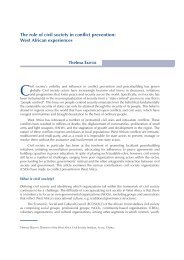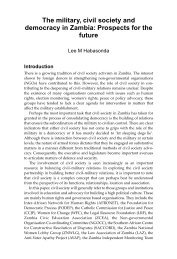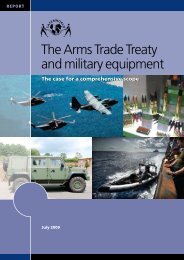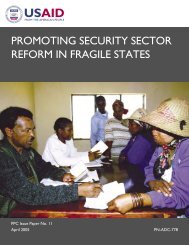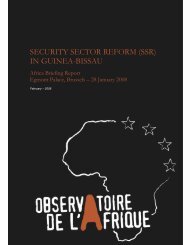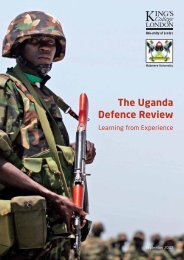AFGHANISTAN'S ELECTION CHALLENGES
AFGHANISTAN'S ELECTION CHALLENGES
AFGHANISTAN'S ELECTION CHALLENGES
Create successful ePaper yourself
Turn your PDF publications into a flip-book with our unique Google optimized e-Paper software.
Afghanistan’s Election Challenges<br />
Crisis Group Asia Report N°171, 24 June 2009<br />
Page ii<br />
community has not spoken up about. Much greater<br />
political will than in 2005 is needed in tackling powerful<br />
players who flout the rules. Ultimately what<br />
will matter in judging the success of the elections is<br />
the perception of the Afghan public.<br />
In the short time remaining before the 2009 polls, the<br />
focus must be on strengthening security provision and<br />
the impartiality, integrity and professionalism of electoral<br />
staff – the front line against fraud. The lessons<br />
learned must be used to ensure a much strengthened<br />
process in 2010. The expense of the current exercise<br />
is unsustainable and highlights the failure after the<br />
2005 polls to build Afghan institutions and create a<br />
more realistic electoral framework. There must also<br />
be well-sequenced post-election planning including<br />
ongoing training and oversight and sufficient funds to<br />
retain the thousands of new police recruited to help<br />
secure the polls.<br />
More broadly there needs to be a focus on building<br />
consensus on how the Afghan political system can be<br />
made more functional and representative, ending the<br />
current over-reliance on a largely unaccountable executive<br />
that has encouraged an ever-growing culture<br />
of impunity. Weakness in institutional development<br />
has only fuelled wider instability through exclusion<br />
and a lack of government services. There must be<br />
broad agreement, even within the bounds of the current<br />
constitution, on a balance of power among the<br />
branches of the state and between the central and local<br />
government; on identifying which body is the ultimate<br />
constitutional arbiter; and ensuring a more appropriate<br />
role for political parties. Embedding democratic<br />
norms and building institutions will better ensure that<br />
the Afghan state is representative, sustainable and<br />
ultimately stable.<br />
RECOMMENDATIONS<br />
To the Independent Election Commission<br />
(IEC):<br />
1. Ensure a robust, credible process by:<br />
(a) rigorous training of election day staff particularly<br />
on new counting procedures;<br />
(b) enforcing multi-layered checks on the results<br />
during their transport including the provision<br />
for observers to travel with the results forms<br />
and ballots;<br />
(c) extra auditing of results from random polling<br />
booths in areas of reported high female turnout<br />
as a check on fraud given unusual registration<br />
numbers, as well as on returns from areas<br />
where little observation is possible because of<br />
insecurity;<br />
(d) scrutinising campaign finance reports of all<br />
presidential candidates and random successful<br />
provincial council candidates; and<br />
(e) requiring all candidates in 2010 to submit<br />
their tax returns.<br />
2. Combat allegations of partisanship by:<br />
(a) the chairman and other electoral staff refraining<br />
from public statements except on technical<br />
issues; and<br />
(b) early and robust action in case of wrongdoing<br />
or partisanship by members of staff.<br />
3. Ensure preparations for the 2010 elections are<br />
strengthened and community understanding of<br />
the process enhanced by holding public workshops<br />
in partnership with local civil society organisations<br />
on lessons from the 2009 polls.<br />
To the Elections Complaints Commission<br />
(ECC):<br />
4. Create a more open complaints process by conducting<br />
a high-profile public awareness campaign<br />
and carrying out training for civil society<br />
organisations to aid understanding of the<br />
grounds for submissions and the required standards<br />
of proof.<br />
To the Government of Afghanistan:<br />
5. Foster the confidence of voters and candidates<br />
through:<br />
(a) ensuring firm, immediate action against government<br />
and security officials seen to be interfering<br />
with the process or intimidating electoral<br />
workers, candidates or voters;<br />
(b) demonstrating compliance with accountable<br />
and transparent appointments mechanisms;<br />
and<br />
(c) guaranteeing the independence of Radio Television<br />
Afghanistan and fostering its role as a<br />
public service broadcaster.<br />
6. Strengthen the 2010 election process by:<br />
(a) building trust in the IEC by putting all commissioners<br />
to a vote in the Wolesi Jirga;<br />
(b) strengthening the quality of data on illegal<br />
armed groups to ensure robust but fair vetting;<br />
(c) driving district delineation required for<br />
planned district elections; and



